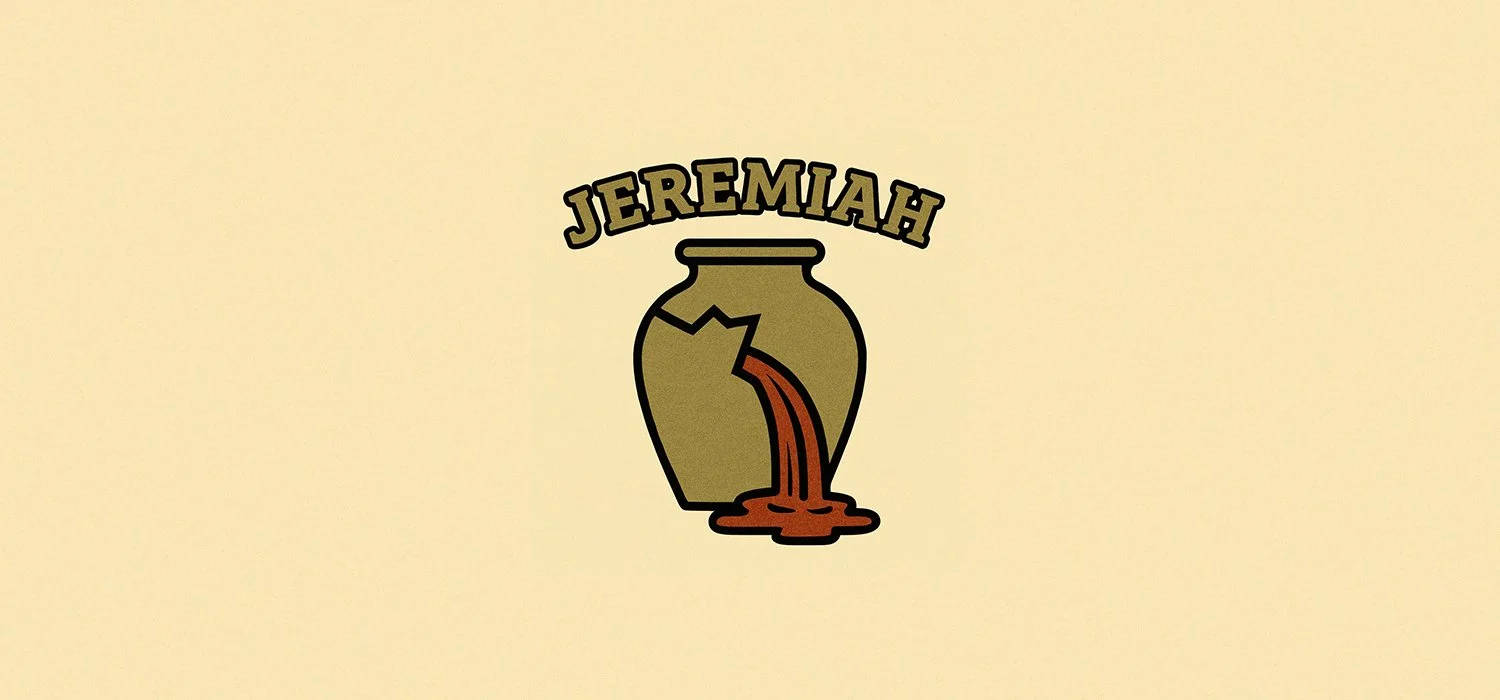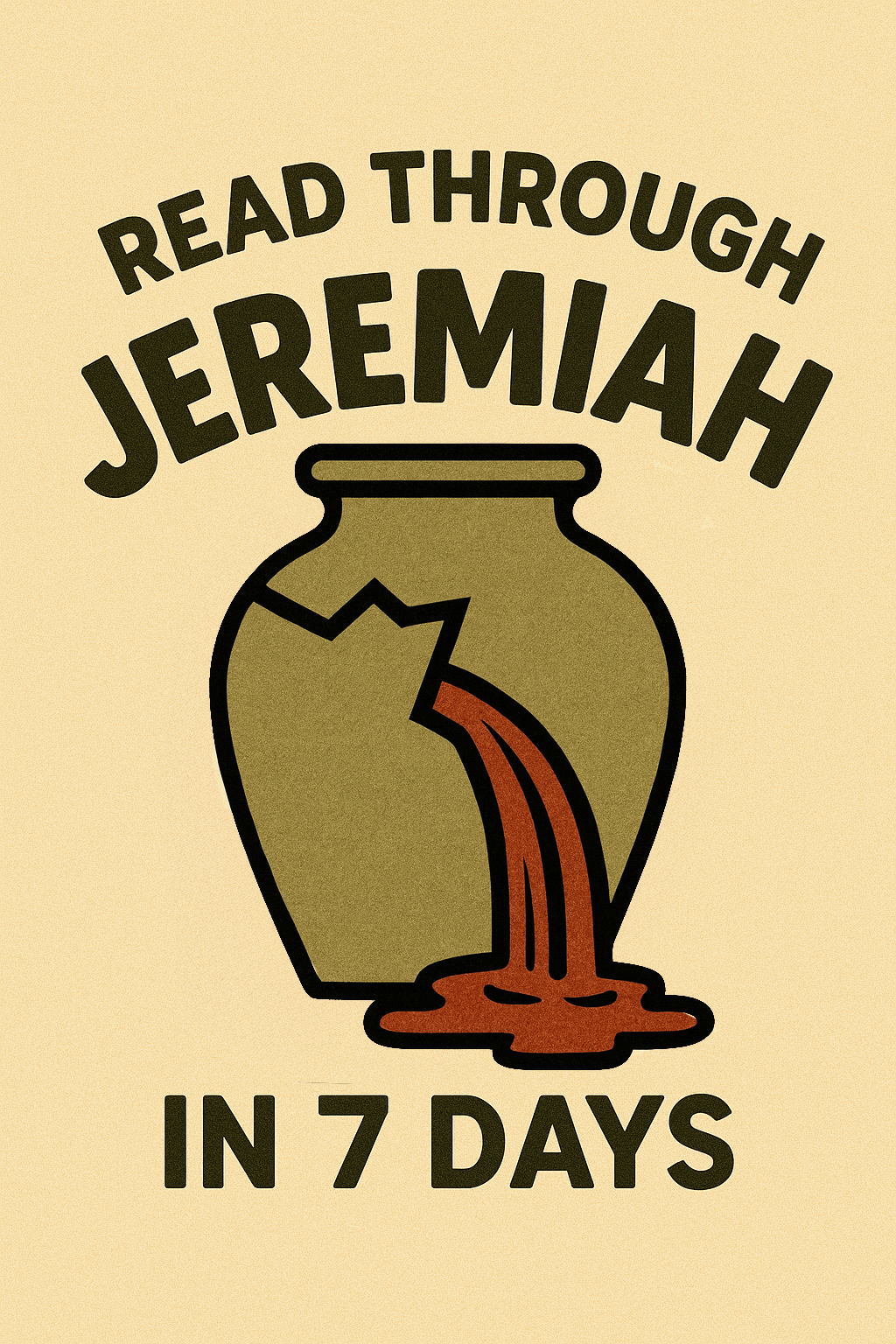
Jeremiah is a prophetic book set in Judah’s final decades before and during the Babylonian exile (late 7th – early 6th century BC). The “weeping” prophet, Jeremiah, delivers God’s urgent call to repent from idolatry, injustice, and false security in temple and kings. Through sermons, symbolic actions, and raw personal laments, he warns that covenant unfaithfulness will bring judgment. All these laments, and warnings culminate in Jerusalem’s fall. Yet he also holds out resilient hope: God will shepherd a remnant, restore his people, and write his law on their hearts in a promised “new covenant” (Jer 31). The book weaves grief and grace, revealing God’s holiness, stubborn love, and a future beyond ruin.
-
Devotional Thought: Jeremiah’s call begins with God’s initiative: “Before I formed you… I knew you”. God doesn’t wait for perfect résumés; He supplies presence and His words. This section exposes Judah’s core sin: trading living water for “broken cisterns”. Idolatry isn’t just statues; it’s any savior-substitute like: control, reputation, or comfort. God’s bluntness isn’t cruel; it’s covenant love calling His people back. He invites truth in the inner person, not performance at the temple door. Begin by naming where you’re sipping from a cistern that leaks, and return to the fountain with honest confession and fresh trust.
Kid Conversation Starter: Where are you tempted to trust something (or someone) more than God? What could it look like to ask God for help first?
-
Devotional Thought: Jeremiah grieves with God’s heart: “Is there no balm in Gilead?”. False prophets soothe with “Peace, peace,” while wounds go untreated. Real hope requires real repentance: turning from self-rule to God’s rule. Chapter 9 centers our boast: not wisdom, power, or riches, but knowing the Lord who practices steadfast love, justice, and righteousness. Lament teaches us to bring tears and truth together. No pretending. No cynicism. Practice “truthful tears” today: name what’s broken, reject flattering lies, and cling to the God who is near to the contrite.
Kid Conversation Starter: How can you tell the difference between words that only make you feel better for a moment and words that help you grow? -
Devotional Thought: Obedience can feel lonely. Jeremiah’s honesty before God is shocking and sacred. God answers not with escape but with presence and resilience: “If you return, I will restore you… I am with you to save you”. The word becomes “a fire in my bones”. God’s truth sustains when feelings fade. These chapters also expose the heart’s deceit and invite a Sabbath posture: that we trust God enough to stop striving. When discouragement hits, choose one small faithful act (pray, rest, speak truth, keep a promise). Faith grows not in grand gestures but in repeated yeses.
Kid Conversation Starter: When you feel like quitting, what’s one small faithful thing you can still do, with God’s help, right now? -
Devotional Thought: God measures leaders by justice, compassion, and integrity. Empty palaces don’t impress Him; defended widows and orphans do. Amid corrupt shepherds, God promises a righteous King: “The Lord is our righteousness”. Chapters 26–28 contrast hard truth with easy lies. Jeremiah wears a yoke to picture surrender to God’s discipline, while Hananiah offers fast-food prophecy that is quick, painless, and false. Spiritual maturity learns to carry God’s yoke and distrust shortcuts. Ask: Where am I seeking comfort more than character? Where might surrender—owning my part, accepting limits, obeying the inconvenient—actually be the path to freedom?
Kid Conversation Starter: What makes someone a good leader at home or school? How could you lead like that this week? -
Devotional Thought: To exiles craving escape, God says: “Build houses… plant gardens… seek the peace of the city”. Hope isn’t passive; it plants, prays, and serves right where it is. Chapters 30–31 lift the horizon: a New Covenant where God writes His law on hearts, all know Him personally, and sins are remembered no more. Jeremiah’s purchase of a field during a siege is embodied hope—staking resources on God’s promises when headlines preach despair. Today, practice “exilic faith”: do one ordinary, faithful thing (serve a neighbor, study, forgive, give) as a seed of the kingdom. Let your calendar and checkbook declare what you believe about tomorrow.
Kid Conversation Starter: If you could plant one “hope seed” at school or home, what would it be—and how would you water it? -
Devotional Thought: The Rechabites’ simple obedience is a living sermon: trust shows up in habits. By contrast, Jehoiakim slices and burns God’s word, yet God rewrites it. Kings fall, cities burn, but God’s purposes endure and His servants (like Ebed-Melech) are seen and preserved. Faith isn’t flashy; it’s steady, listening, obeying, protecting the vulnerable, and honoring God’s voice even when it’s costly. Consider one practice to reinforce obedience (device-free dinner, weekly generosity, Scripture before screens). God’s word can be resisted, but it cannot be erased; align your rhythms with what lasts.
Kid Conversation Starter: What’s a small habit that shows you love and trust God? How can we practice it together this week?
-
Devotional Thought: After catastrophe, survivors ask Jeremiah for guidance then refuse it, fleeing to Egypt. Safety without surrender is a trap. The oracles to the nations remind us God’s justice and mercy span the globe; Babylon itself will fall. The book ends with Jehoiachin’s quiet elevation in exile, a whisper that judgment isn’t God’s final word. Christian hope hears in Jeremiah’s story the approach of the Righteous Branch and the New Covenant fulfilled in Jesus. Finish by entrusting your “Egypts” (self-made shelters) to God, praying for the nations, and choosing hope that acts. The God who disciplines is the God who restores.
Kid Conversation Starter: What’s one area where you want to trust God instead of taking the fastest, easiest route? What would trusting look like today?
VIDEOS:
The Bible Project
BOOKS:
Erasing Hell - Francis Chan
https://www.amazon.com/Erasing-Hell-About-Eternity-Things/dp/0781407257?s=books&linkId=755d7c04bab986e331f011f1e091e452The Disciple Scroll - Allan Rabinowitz
PODCASTS:







